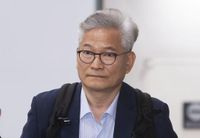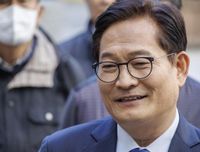As South Korea awaited the final results of its presidential election on June 3, 2025, a stirring message from behind bars captured the nation’s attention. Song Young-gil, the imprisoned leader of the Sonamu Party, sent a heartfelt letter through his lawyer, celebrating the anticipated victory of Lee Jae-myung, the Democratic Party’s presidential candidate. The message, posted on Song’s Facebook page, revealed his joy and hope for a new political era, even as he remained confined.
Song expressed his elation by saying, “I hear surprising news from prison. I am bursting with joy alone,” underscoring the profound personal significance of the moment. He pinpointed the first legislative priority of the incoming Lee Jae-myung government: the swift passage of a special law addressing internal rebellion. This, he argued, was essential for the nation’s healing and justice.
Reflecting on the previous administration, Song did not hold back his criticism. He labeled the three-year rule of President Yoon Suk-yeol’s government as “the most incompetent and corrupt government in history,” accusing it of mismanaging all facets of governance — political, economic, diplomatic, and defense. More pointedly, Song blamed the government’s survival on the grip held by Yoon and his close ally Han Dong-hoon over the prosecution’s special units, which he described as a “cartel of crimes.”
According to Song, this cartel wielded its monopoly on searches, arrests, and indictments as tools of fear and control. He alleged that these special prosecution units had effectively terrorized politicians, the media, and businesses alike, using threats of separate investigations to muzzle dissent and maintain power. The oppressive atmosphere, Song suggested, was a form of “terror politics” that stifled democratic processes.
Song’s letter also warned against repeating the mistakes of the previous Moon Jae-in administration, which had relied heavily on the prosecution to purge entrenched corruption. Instead, he called for a new approach that dismantles the political prosecution system itself. “They are not investigative agencies but agencies of fabrication,” Song said of the special prosecution units, emphasizing that they should be the subject of investigation rather than its enforcers.
He urged the Democratic Party to act decisively and pass the special law for internal rebellion without delay. For Song, the foundation of Lee Jae-myung’s government and its promise of national unity rests on suppressing rebellious forces and breaking the hold of political prosecution. This, he insisted, would lay the groundwork for genuine national integration and justice.
The timing of Song’s message was poignant. It was sent on June 2, a day before the election, through his lawyer, anticipating Lee Jae-myung’s victory. Song’s own political journey is intertwined with Lee’s rise; after losing the 2022 presidential race, Lee was given Song’s electoral district in Incheon Gyeyang, providing him a vital platform for political resurgence. Meanwhile, Song has been serving a two-year prison sentence since January 2025 for violations of the Political Funds Act, a conviction stemming from charges of illegal political funding.
Song lamented his inability to campaign during the election, calling it a “cruel situation” that he was not granted bail even for a single day to advocate for the special law aimed at internal rebellion. His incarceration has been a symbol of the very political prosecutions he now condemns.
The exit polls from South Korea’s three major broadcasters—KBS, MBC, and SBS—showed Lee Jae-myung leading with 51.7% support, followed by Kim Moon-soo of the People Power Party at 39.3%, and Lee Jun-seok of the Reform Party at 7.7%. These polls were based on data collected from 81,460 voters across 325 polling stations nationwide, offering a margin of error of ±0.8% at a 95% confidence level.
Song’s letter also touched on ongoing investigations. He called for the halt of the probe led by Prosecutor General Shim Woo-jung, related to the so-called “Shim Woo-jung faction,” while investigations by the National Police Agency and the Corruption Investigation Office for High-ranking Officials proceed. He framed this as a crucial moment to pass the special law swiftly and avoid repeating the shortcomings of prior administrations.
Beyond the political rhetoric, Song’s stance is linked to a broader struggle over alleged political manipulation and corruption. He has previously supported efforts to expose manipulation involving prominent figures such as Yoon Suk-yeol, Han Dong-hoon, and SK Telecom’s Choi Tae-won, particularly concerning a controversial tablet PC case pursued by Media Watch representative Byun Hee-jae for eight years. Observers suggest that Song’s release could signal a turning point in this ongoing “truth struggle.”
As the nation stands on the cusp of political transition, Song Young-gil’s words from prison resonate as both a personal testament and a call for systemic reform. His insistence on confronting what he terms the “cartel of crimes” within the prosecution reflects deep-seated tensions in South Korea’s political fabric, underscoring the challenges that lie ahead for the incoming government.
In this charged atmosphere, Lee Jae-myung’s projected victory marks not only a change in leadership but also a potential shift in how justice and governance are approached. The coming months will reveal whether the promises of reform and national unity can be realized amid entrenched institutional power struggles.





